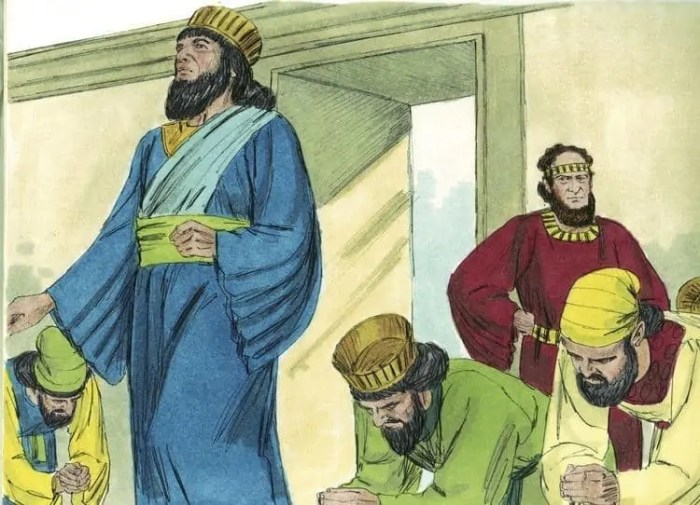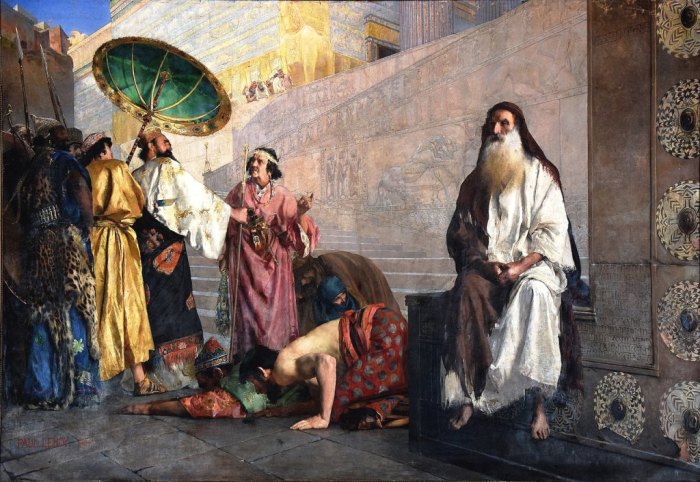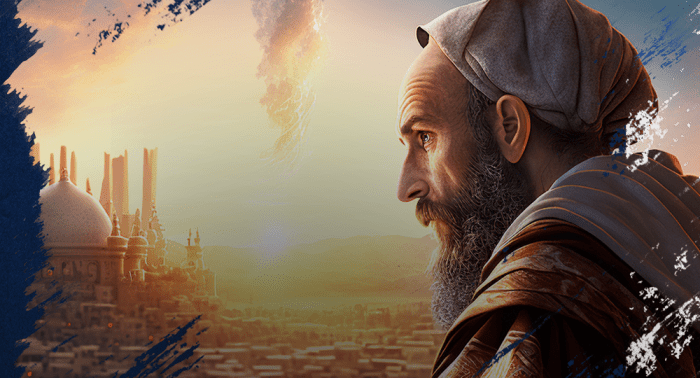Why didn’t Mordecai bow to Haman? This intriguing question unveils a captivating tale of faith, courage, and divine intervention. Set against the backdrop of ancient Persia, this narrative explores the conflict between a devout Jew and a haughty official, highlighting the power of conviction and the consequences of defiance.
Mordecai, a righteous man of unwavering faith, refused to bow to Haman, the king’s arrogant advisor, sparking a chain of events that would forever alter their destinies. This essay delves into the reasons behind Mordecai’s refusal, the ensuing conflict, and the ultimate reversal of fortune that unfolded.
Mordecai’s Character and Values: Why Didn’t Mordecai Bow To Haman
Mordecai, a devout Jew living in the Persian Empire, exemplified unwavering moral principles and steadfast beliefs. His unwavering faith in God and loyalty to his people guided his actions. Mordecai’s courage and determination to stand up for what he believed in, even in the face of adversity, serve as a testament to his exceptional character.
Mordecai’s Loyalty and Faith
Mordecai’s loyalty to God and his people was unwavering. He refused to compromise his beliefs, even when it meant putting his life at risk. Mordecai’s faith in God sustained him through challenges and trials, providing him with the strength to remain steadfast in his convictions.
Haman’s Authority and Pride

Haman, the king’s advisor, possessed immense authority and power. His arrogance and insatiable desire for recognition led him to demand that all bow down to him. Haman’s haughty behavior and disregard for others alienated many within the king’s court.
Haman’s Arrogance and Entitlement
Haman’s arrogance manifested in his belief that he deserved to be treated as superior to others. He demanded that all bow down to him, regardless of their status or beliefs. Haman’s entitlement led him to view himself as above the law and beyond reproach.
The Refusal to Bow
In the Persian culture, bowing was a sign of respect and submission. King Xerxes decreed that all should bow down to Haman. However, Mordecai refused to comply, citing his religious beliefs and his unwillingness to bow to anyone other than God.
Mordecai’s Principled Stance, Why didn’t mordecai bow to haman
Mordecai’s refusal to bow to Haman was not an act of disrespect towards the king but a principled stand against idolatry. He believed that bowing to Haman would be tantamount to worshipping a false god. Mordecai’s unwavering faith in God gave him the courage to defy the king’s decree.
Mordecai’s Conflict and Consequences
Mordecai’s refusal to bow to Haman ignited a conflict that threatened his life. Haman, enraged by Mordecai’s defiance, plotted to have him and all the Jews in the empire killed.
Haman’s Plot and Mordecai’s Peril
Haman’s plot against Mordecai and the Jews was cunning and ruthless. He convinced King Xerxes that the Jews were a threat to the empire and that they should be exterminated. Mordecai’s life and the lives of his people hung in the balance.
God’s Intervention and Protection

Despite the grave danger he faced, Mordecai remained steadfast in his faith. He believed that God would intervene and protect him and his people. And indeed, God did intervene through a series of miraculous events.
Esther’s Intervention and Haman’s Downfall
God used Queen Esther, Mordecai’s cousin, to thwart Haman’s plot. Esther revealed Haman’s evil intentions to the king, leading to Haman’s downfall and execution. Mordecai was saved from certain death, and the Jewish people were spared from extermination.
The Reversal of Fortune

The events surrounding Mordecai’s refusal to bow to Haman resulted in a dramatic reversal of fortune for both men. Mordecai, who had faced imminent death, was honored by the king and given a position of authority.
Mordecai’s Triumph and Haman’s Demise
Mordecai’s unwavering faith and courage were rewarded. He was promoted to Haman’s former position as the king’s advisor. Haman, on the other hand, faced a gruesome end, being hanged on the gallows he had built for Mordecai.
User Queries
What was the significance of bowing in Persian culture?
Bowing was a sign of respect and submission, and refusing to bow was seen as an act of defiance and disrespect.
Why did Mordecai refuse to bow to Haman?
Mordecai refused to bow to Haman because he believed that bowing to anyone other than God was a violation of his faith.
What were the consequences of Mordecai’s refusal to bow?
Mordecai’s refusal to bow led to a conflict with Haman, who plotted to have Mordecai and all the Jews in the kingdom killed.
How did God intervene in the situation?
God intervened by revealing Haman’s plot to Queen Esther, who then persuaded the king to spare Mordecai and the Jews.
What was the ultimate outcome of the conflict?
Haman was punished for his treachery, and Mordecai was honored for his courage and faith.